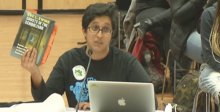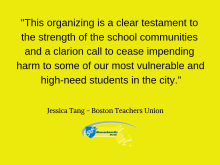When Boston Public Schools officials announced their intention to close a middle school and two high schools last October, Neema Avashia was ready.

She and her colleagues had been working for two years to plan the middle school’s transition to a 7-12 school when they found out that district officials planned to close the McCormack, send students to a different school, and, after renovating the McCormack, put the building out to bid for other 7-12 schools to take over.
Avashia, who has taught at the McCormack for fifteen years, vividly remembers the reaction of her students: ‘We’re getting evicted in our neighborhoods, and now we’re getting evicted from our school.” “People keep making things nice, but not for us.”
Allison Doherty, a special education teacher at the West Roxbury Education Complex (WREC), had also been engaged in plans to evolve her school, but those plans to merge the West Roxbury Academy and Urban Science Academy, the two high schools on the WREC campus, were abandoned when the district announced a new plan to close the campus and disperse students to schools around the district, citing safety concerns with the building complex.
“We knew there were schools with room to keep our school communities together,” said Doherty. “We’re never going to have a plan that everybody likes, but we can do better than a plan that everybody hates.”
Educators organize and fight back
Educators at the McCormack and the WREC, with support from fellow BTU members and Boston Teachers Union staff along with community allies such as the Boston Education Justice Alliance (BEJA), started organizing against the school closures that day.
“I’d never used Twitter before, but I signed up on the day of the announcement, followed everyone who had tweeted about the BPS bell times fight [a major public debate in the Boston schools over the prior year], and started posting about what was wrong with the district’s plans,” said Avashia. “Within days, reporters were contacting me to hear our side of the story.”
Avashia and Doherty both spoke to media outlets about the closures, helped organize students and educators to testify School Committee meetings, sent letters to the editor, and attended meetings with city councilors. Several councilors wrote a letter to the School Committee, which stated that “school closures should be the absolute last resort,” and asked that the School Committee work to keep school communities intact.

In the end, BPS officials agreed to shift their plan for the McCormack. Under the new plan, “McCormack teachers will help select a high school to partner with and create a new 7-12 school to move into the newly constructed building on the McCormack site,” according to WBUR. But with only minor changes, the School Committee approved plans to close the West Roxbury Education Complex.
“The only movement from their plan was to keep seniors together for their last year, but they’ll be on a middle school campus with no sports, no extracurricular activities, and maybe even no AP classes, said Doherty. “It’s also hard to get teachers to sign up for a single year at a school with no future. There are so many problems with this plan that could have been avoided if the district had more interest in collaboration.”
Lessons learned
Avashia and Doherty both stressed that educators should be prepared for attempted school closures, build connections with other communities who can stand up for your school, and be ready to tell your own stories.
“Don’t wait for this to happen,” said Doherty. “Be proactive, because this is coming for you. Now is the time to band together with other educators and community allies.”
“Being able to tell the story and control the narrative is important,” said Avashia. “We have to connect to larger issues like gentrification and systemic racism, not give in to their narrative of limited resources. There can be pressure not to talk to the media, but the risk is worth it. I’m a civics teacher, and you don’t tell me not to use my first amendment rights.”
Both agreed that kids are the strongest advocates, and educators should make sure to make space for their students to speak up, whether it’s in testimony to the school committee or in conversations with elected officials and reporters.
“Our kids are not expendable,” said Avashia. “They can’t wait five years for something better.”
